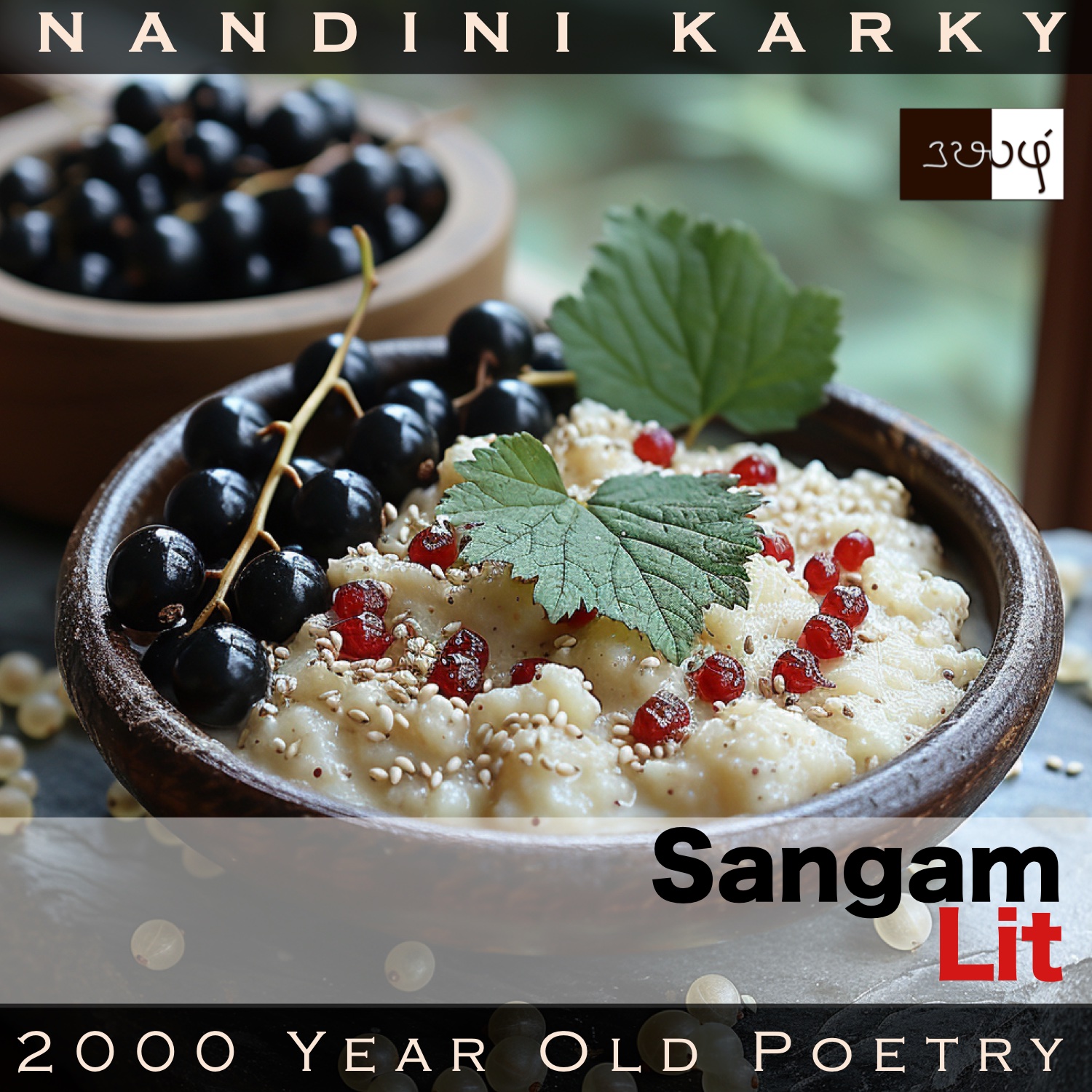Podcast: Play in new window | Download
Subscribe: Apple Podcasts | Spotify | Amazon Music | Android | iHeartRadio | Email | TuneIn | RSS | More
In this episode, we observe the promise of good food, as portrayed in Sangam Literary work, Puranaanooru 328, penned by an anonymous poet. The verse is situated in the category of ‘Vaagai Thinai’ or ‘Victory’ and talks about a leader’s generosity in the midst of difficult circumstances.

……….டை முதல் புறவு சேர்ந்திருந்த
புன் புலச் சீறூர், நெல் விளையாதே;
வரகும் தினையும் உள்ளவை எல்லாம்
இரவல் மாக்களுக்கு ஈயத் தொலைந்தன;
…………….. டு அமைந்தனனே;
அன்னன் ஆயினும், பாண! நன்றும்
வள்ளத்திடும் பாலுள் உறை தொட….
களவுப் புளி அன்ன விளை….
…………..வாடு ஊன் கொழுங் குறை
கொய் குரல் அரிசியொடு நெய் பெய்து அட்டு,
துடுப்பொடு சிவணிய களிக் கொள் வெண் சோறு
உண்டு, இனிது இருந்த பின்
… … … … …. … தருகுவன் மாதோ
தாளி முதல் நீடிய சிறு நறு முஞ்ஞை
முயல் வந்து கறிக்கும் முன்றில்,
சீறூர் மன்னனைப் பாடினை செலினே.
With multiple words missing, this verse is a case of ‘fill in the blanks’ with your imagination. The poet’s words can be translated as follows:
“… a dry lands domain with an infertile soil, and in a small village here, paddy grows not; Only proso millets and foxtail millets sprout on. Even those, after being rendered unto supplicants are no more. Such is the situation! While that may be so, O bard, a bowl of curd along with the sour ‘kalavu’ fruit, and fleshy meat cooked with rice from thick stalks, poured with ghee, and mixed with a ladle, intoxicating white rice, all this… you can feed on and rest for a while. He will render all this, for sure, if you sing the praises of that king of a small town, in whose front yard, a rabbit arrives to munch on the small and fragrant leaves of the ‘munnai tree’ laid out to dry!”
Let’s explore the details. The poet starts by mentioning the domain of a leader saying it’s not the agricultural domain with fertile farmlands in a lush river valley. This is a drylands region, which looks up to the sky for its nourishment, and hence in this soil, only millets sprout and rice is no where to be found. While that is the case, the leader will make sure to give a bowl of curd with a sour fruit of ‘bengal currant’, which incidentally is used to make pickles these days and continues to serve as an accompaniment to that yoghurt being relished two thousand years ago.
Then the poet goes on to say, the leader would offer meat with rice, stirred in with ghee, and this made me wonder how would he do that when his land supports not the growth of rice. Perhaps, he brings them home when he returns from his adventures, or maybe, a bard will be given that feeling of savouring rich ghee rice with meat even with the humble offerings of millets and curd, because of the nature of that king’s hospitality. The poet concludes with a description of this king’s home, saying the leaves of the ‘dusky fire-brand teak’ are laid out to dry, to be used as seasoning, and these are being munched on by some rabbits roving around.
The thought that came to me was these ‘kings’ described so by Sangam poets, lived such humble lives in such humble homes. But one thing that was common was their ability to alleviate the suffering of travelling artists and supplicants with whatever they could, be it a humble offering of millets and curd or a delicious spread of ghee rice and meat!




Share your thoughts...